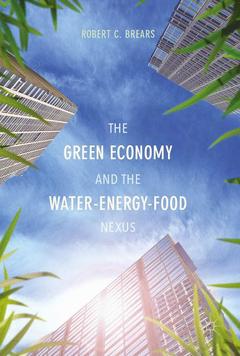Description
The Green Economy and the Water-Energy-Food Nexus, 1st ed. 2018
Language: English
Subjects for The Green Economy and the Water-Energy-Food Nexus:
Publication date: 11-2020
423 p. · 14.8x21 cm · Paperback
423 p. · 14.8x21 cm · Paperback
Description
/li>Contents
/li>Biography
/li>Comment
/li>
This book argues that a variety of policies will be required to create synergies between the water-energy-food nexus sectors while reducing trade-offs in the development of a green economy. Despite rising demand for water, energy and food globally, the governance of water-energy-food sectors has generally remained separate with limited attention placed on the interactions that exist between them.
Brears provides readers with a series of in-depth case studies of leading cities, states, nations and regions of differing climates, lifestyles and income-levels from around the world that have implemented a variety of policy innovations to reduce water-energy-food nexus pressures and achieve green growth.
The Green Economy and the Water-Energy-Food Nexus will be of interest to town and regional planners, resource conservation managers, policymakers, international companies and organisations interested in reducing water-energy-food nexus pressures, environmental NGOs, researchers, graduate and undergraduate students.
1. introduction.- 2. The Green Economy.- 3. The Green Economy and Sustainable Development.- 4. Policy Tools to Reduce Water-Energy-Food Nexus Pressure.- 5. The Green Economy and the Water-Energy-Food Nexus in New York City.- 6. The Green Economy and the Water-Energy-Food Nexus in Singapore.- 7. The Green Economy and the Water-Energy-Food Nexus in Massachusetts.- 8. The Green Economy and the Water-Energy-Food Nexus in Ontario.- 9. The Green Economy and the Water-Energy-Food Nexus in Denmark.- 10. The Green Economy and the Water-Energy-Food Nexus in Korea.- 11. The Green Economy and the Water-Energy-Food Nexus in the Colorado River Basin.- 12. The Green Economy and the Water-Energy-Food Nexus in the Murray-Darling River.- 13. The Green Economy and the Water-Energy-Food Nexus in the Rhine River Basin.- 14. Best Practices.- 15. Conclusions.
Robert C. Brears is the founder of Mitidaption, Mark and Focus, and is Director on the International Board of the Indo Global Chamber of Commerce, Industries and Agriculture.
Presents a series of case studies that illustrate how cities, states, nations and regions of differing climates, lifestyles and income-levels have implemented policies to reduce water-energy-food nexus pressures Discusses the components of the food-water-energy nexus and the pressures it faces from rapid economic growth and climate change Provides a review of the various fiscal and non-fiscal tools available for reducing the global demand on the water, energy and food sectors
© 2024 LAVOISIER S.A.S.




